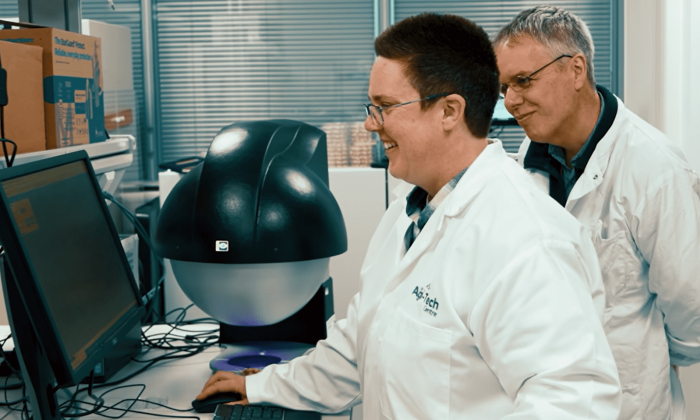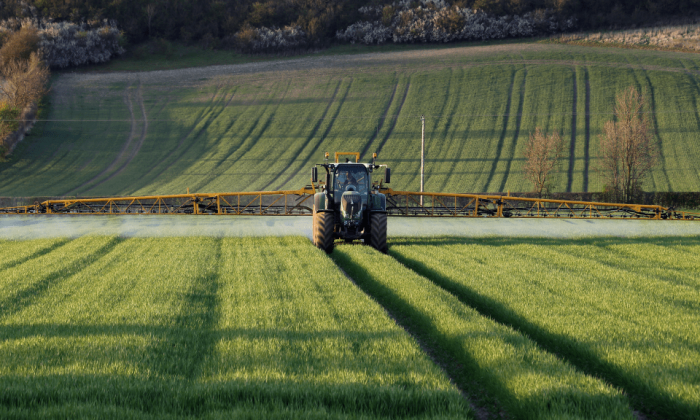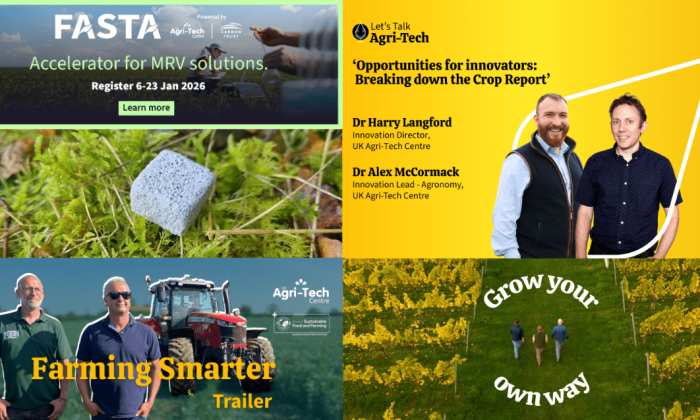Effective nutrient management is vital to modern farming and agriculture, protecting the health of our planet and driving the sustainability of food production.
Harry Langford, Head of Sustainability at the UK Agri-Tech Centre, notes:
Manufactured and organic fertiliser application represents approximately half of the ammonia emission from UK agriculture. Considering that the National Emission Ceiling Regulations require a 16% reduction in ammonia emissions by 2030, there is a significant opportunity for innovation in nutrient management to support the sector in achieving this.
Nutrient management involves practices and technologies to optimise the use of nutrients in agriculture while minimising environmental impacts. This includes balancing nutrient application, storage, and recycling to ensure that the right amount of nutrients reach crops without causing excess emissions or pollution.
In the UK, agriculture generates approximately 10% of greenhouse gas (GHG) emissions, with nitrous oxide—a particularly potent GHG—contributing significantly to this total. The primary sources of these emissions are grazing returns, storage, and the application of organic manures and artificial nitrogen fertilisers. Given that 70% of the UK’s total emissions are linked to agriculture, nutrient management plays a critical role in reducing environmental damage and fostering sustainability.
Agricultural waste is a significant contributor to water pollution. In England and Wales, about 60% of nitrates and 25% of phosphates in water sources originate from farming practices. This pollution affects ecosystems and poses risks to human health, leading to an estimated annual cost of £3 billion due to pollution, and other agricultural impacts.
Whilst they do underpin a significant boost in yield, the reliance on synthetic fertilisers is another concern. In the EU, for every five tonnes of nitrogen entering the agri-food chain, only one tonne becomes finished products for human consumption. The rest is lost through emissions and waste. In the UK, farmers use around 1.5 million tonnes of manufactured fertilisers each year, with almost one million tonnes being nitrogen. The carbon footprint of synthetic nitrogen is substantial, accounting for up to two-thirds of a crop’s carbon footprint and approximately 6% of all agri-food emissions.
Strengthening Nutrient Circularity in UK Agriculture
Nutrient circularity is increasingly recognised as a critical pathway to transform UK agriculture by optimising the recycling and reuse of nutrients. This approach not only enhances the efficiency of nutrient use but also significantly reduces waste and emissions, aligning with national sustainability goals. Through innovative technologies and practices, nutrient circularity is making strides in reshaping agricultural methods to be more environmentally responsible and economically viable.
Claire Hodge, Head of Agri-Systems at the UK Agri-Tech Centre, notes:
Efficiency is paramount in agricultural systems. Our focus on nutrient management and circularity is driven by the goal of maximising food production while minimising environmental impact. There is a need to prioritise efficiency to ensure a sustainable future for agriculture. Integrating systems from our food and energy networks offers promising pathways towards a more sustainable agriculture. By harnessing synergies between different components of agricultural production, these systems offer innovative solutions to enhance resource efficiency, promote circularity, and foster resilience in the face of environmental challenges.
Read below for a more detailed understanding of key focus areas and examples of the UK Agri-Tech Centre projects
Advanced Waste Management Technologies
Technologies like advanced composting, anaerobic digestion, and thermal treatment are at the forefront of transforming organic waste into valuable agricultural inputs. These technologies help stabilise nutrients and reduce losses, integrating sustainability directly into the nutrient management cycle.
Project Spotlight: The Micro AD Farm project, developed by BioFactory, leverages Anaerobic Digestion (AD) technology to transform cow slurry into renewable energy on small to medium-sized farms. This scalable and modular system efficiently manages nutrient-rich waste, enhancing slurry quality for better crop nutrient uptake and soil health, while also reducing greenhouse gas emissions. The project directly addresses nutrient management in agricultural waste, aligning with ecological goals by producing biogas as an alternative to conventional energy sources. For more details, you can visit the Micro AD Farm website.
Soil and Water Conservation Practices
Regenerative agricultural techniques, such as no-till farming, cover cropping, and strategic livestock management, play a crucial role in improving soil health and reducing runoff. These practices preserve soil organic matter and enhance carbon sequestration, contributing to the resilience and sustainability of farming operations.
Project Spotlight: The Potato-LITE project, supported by Innovate UK, is spearheaded by a consortium including PepsiCo and McCain Foods. This initiative focuses on developing sustainable tillage practices for potato farming to reduce greenhouse gas emissions, improve soil health, and optimize tillage intensity. By introducing innovative machinery and cultivation techniques, the project aims to enhance environmental sustainability and economic viability in the UK potato sector. For more information, you can visit the Potato-LITE project website.
Enhanced Resource Management
Precision agriculture technologies, including AI-driven insights and real-time data analysis from advanced sensors, are revolutionising how nutrients are applied in the fields. These technologies ensure that nutrients are efficiently used, minimising over-application and environmental contamination.
Project Spotlight: The SprayBot project, funded by Innovate UK, brings together multiple technologies to develop precision detection and application approaches in arable crops. Combining remote monitoring using spore traps and DNA diagnostics to forecast infection risk, multispectral cameras on a sprayer boom to detect early disease infection, and precision application nozzles to target pre-symptomatic infections and areas of infected plants. This project showcases how combining technologies can enable growers to better target and reduce input usage. The project is a collaboration between; the UK Agri-Tech Centre, University of Newcastle and FOTENIX, supported by Rothamsted Research and Silsoe Spray Applications Unit.
Risk Mitigation Strategies
New approaches to reduce or remediate contamination risks are critical in ensuring the safety and efficacy of nutrient recycling. Techniques such as heat treatment and chemical disinfection, or extraction and partitioning technologies, guarantee that recycled nutrients are free from pathogens, supporting safe and sustainable reuse in agriculture.
Project Spotlight: The NTPlus project, supported by Innovate UK’s Sustainable Innovation Fund, showcases an innovative approach to transforming water treatment byproducts into a valuable liquid fertiliser. Led by Agua DB Ltd, the project explored the feasibility of a new process that not only removes nitrate from groundwater but also repurposes it as a sustainable agricultural input. This process not only aids in achieving environmental sustainability by reducing nitrate levels in water bodies, which are harmful to aquatic life and can degrade drinking water quality but also supports agricultural productivity by turning potential waste into a resource.
Grant Funding Opportunity: Farming Futures R&D Fund Nutrient Management
The Farming Futures R&D Fund Nutrient Management competition presents a significant opportunity for businesses, research organisations, farmers, and growers in the UK. This initiative, backed by the Department for Environment, Food and Rural Affairs (Defra) as part of the Farming Innovation Programme, aims to fund collaborative research and development projects that create innovative solutions to nutrient management challenges in agricultural soil and water.
Projects funded under this initiative will focus on:
- Improving the management of nitrogen and phosphate in soil and water to enhance crop growth and yield.
- Reducing runoff and pollution to improve air quality and greenhouse gas emissions.
- Addressing nutrient management from both organic sources like farm waste and synthetic sources such as commercial fertilisers.
- Enhancing the quality of ground and river water through improved nutrient application techniques.
Leading Innovation in Agriculture
As the UK’s largest agri-tech organisation, the UK Agri-Tech Centre is dedicated to pioneering agricultural advancements through robust cross-sector collaboration. We invite entrepreneurs, researchers, and businesses to join our expansive network. By partnering with us, you become an integral part of a large, easily navigable ecosystem designed to stimulate growth and accelerate the adoption of cutting-edge agricultural technologies.
Our approach integrates a systems-wide perspective to address sector challenges and explore expansion opportunities, ensuring that you have access to the best tools, knowledge, and connections needed to succeed. Engage with us and propel your agri-tech innovations from concept to reality, benefiting from our strong commitment to fostering collaboration and innovation across the agricultural sector.
Nikki Dalby, Head of One Health at the UK Agri-Tech Centre, notes:
Effective nutrient management is essential for achieving sustainability goals. There are numerous strategies to enhance nutrient management and promote circularity. We have already started advancing these initiatives, and we are eager to continue this progress.
Are you Looking to Drive Change in Nutrient Management?
The UK Agri-Tech Centre continues to drive innovation in nutrient circularity by fostering collaborations that bridge gaps between research, industry, and policymakers.
Strategic Partnership and Consortium Building: Leverage our established relationships with over 600 diverse organisations, including start-ups, SMEs, and established companies, farmers from the agri-industries.
Expert Bid Writing and Project Management: With a portfolio of 440 successful projects, our expertise in bid writing and project management ensures your projects are not only visionary but also viable, with a clear path to commercial success.
Access to Our Farm Network and Technical Capabilities: Utilise our farm network for real-world testing and validation of your technologies. Our technical capabilities span from early-stage R&D to advanced technological applications.
Further reading:
UK Parliament Briefing: ‘The Future of Fertiliser Use’ with contributions from the UK Agri-Tech Centre specialists.
Report: Why Nitrogen Matters in Livestock.



